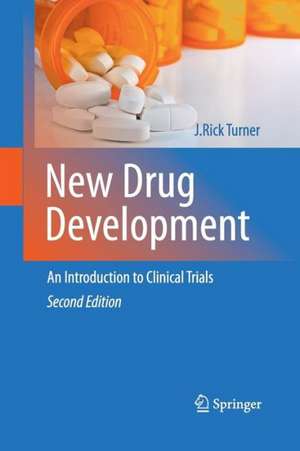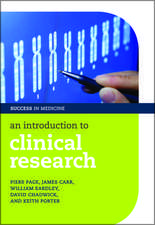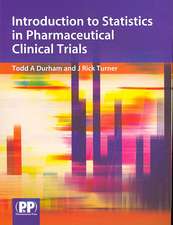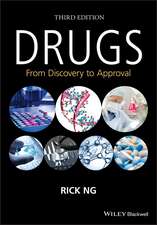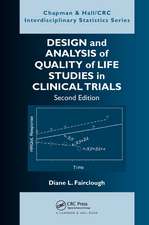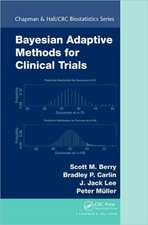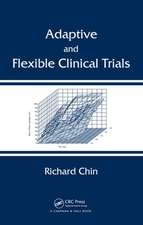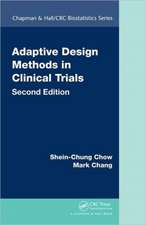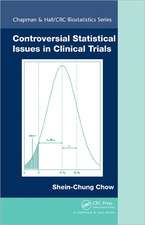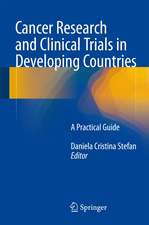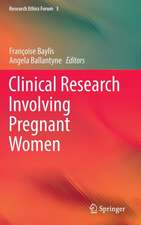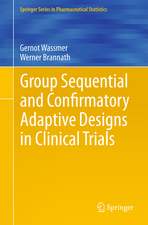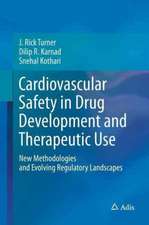New Drug Development: An Introduction to Clinical Trials: Second Edition
Autor J. Rick Turneren Limba Engleză Paperback – 19 oct 2014
| Toate formatele și edițiile | Preț | Express |
|---|---|---|
| Paperback (1) | 1653.72 lei 6-8 săpt. | |
| Springer – 19 oct 2014 | 1653.72 lei 6-8 săpt. | |
| Hardback (1) | 1682.11 lei 6-8 săpt. | |
| Springer – 2 aug 2010 | 1682.11 lei 6-8 săpt. |
Preț: 1653.72 lei
Preț vechi: 2016.72 lei
-18% Nou
Puncte Express: 2481
Preț estimativ în valută:
316.43€ • 329.60$ • 263.79£
316.43€ • 329.60$ • 263.79£
Carte tipărită la comandă
Livrare economică 29 martie-12 aprilie
Preluare comenzi: 021 569.72.76
Specificații
ISBN-13: 9781493900916
ISBN-10: 1493900919
Pagini: 284
Ilustrații: XXV, 256 p.
Dimensiuni: 155 x 235 x 15 mm
Greutate: 0.45 kg
Ediția:2nd ed. 2010
Editura: Springer
Colecția Springer
Locul publicării:New York, NY, United States
ISBN-10: 1493900919
Pagini: 284
Ilustrații: XXV, 256 p.
Dimensiuni: 155 x 235 x 15 mm
Greutate: 0.45 kg
Ediția:2nd ed. 2010
Editura: Springer
Colecția Springer
Locul publicării:New York, NY, United States
Public țintă
ResearchDescriere
New Drug Development: Second Edition provides an overview of the design concepts and statistical practices involved in therapeutic drug development. This wide spectrum of activities begins with identifying a potentially useful drug candidate that can perhaps be used in the treatment or prevention of a condition of clinical concern, and ends with marketing approval being granted by one or more regulatory agencies. In between, it includes drug molecule optimization, nonclinical and clinical evaluations of the drug’s safety and efficacy profiles, and manufacturing considerations. The more inclusive term lifecycle drug development can be used to encompass the postmarketing surveillance that is conducted all the time that a drug is on the market and being prescribed to patients with the relevant clinical condition. Information gathered during this time can be used to modify the drug (for example, dose prescribed, formulation, and mode of administration) in terms of its safety and its effectiveness.The central focus of the first edition of this book is captured by its subtitle, 'Design, Methodology, and Analysis'. Optimum quality study design and experimental research methodology must be employed if the data collected—numerical representations of biological information—are to be of optimum quality. Optimum quality data facilitate optimum quality statistical analysis and interpretation of the results obtained, which in turn permit optimum quality decisions to be made: Rational decision making is predicated on appropriate research questions and optimum quality numerical information. The book took a non-computational approach to statistics, presenting instead a conceptual framework and providing readers with a sound working knowledge of the importance of design, methodology, and analysis. Not everyone needs to be an expert in statistical analysis, but it is very helpful for work (or aspire to work) in the pharmaceutical and biologics industries to be aware of the fundamental importance of a sound scientific and clinical approach to the planning, conduct, and analysis of clinical trials.
Cuprins
Preface 1.Foreword 2.New Drug Development 3.The Regulatory Environment 4.Drug Discovery 5.Nonclinical Research 6.Designing Clinical Trials 7.Conducting Clinical Trials I: Experimental Methodology 8.Conducting Clinical Trials Ii: Operational Execution 9.Statistical Analysis 10.Statistical Significance 11.Clinical Significance 12.Sample-Size Estimation 13.General Safety Assessments 14.Efficacy Assessment 15.Cardiac And Cardiovascular Safety Assessments 16.Manufacturing Small-Molecule Drugs And Biologicals 17.Postmarketing Surveillance 18.Main Themes And Concluding Comments Reference List Index
Recenzii
From the reviews of the second edition:
“‘New Drug Development: An Introduction to Clinical Trials, 2nd Edition’ is a solid introduction to the process of drug development, with an emphasis on clinical research, especially the statistical aspects. It is ideal for readers interested in clinical research within the broader context. The book is written in a practical and straightforward manner … .” (Norman M. Goldfarb, Journal of Clinical Research Best Practices, Vol. 9 (5), May, 2013)
“‘New Drug Development: An Introduction to Clinical Trials, 2nd Edition’ is a solid introduction to the process of drug development, with an emphasis on clinical research, especially the statistical aspects. It is ideal for readers interested in clinical research within the broader context. The book is written in a practical and straightforward manner … .” (Norman M. Goldfarb, Journal of Clinical Research Best Practices, Vol. 9 (5), May, 2013)
Notă biografică
Dr. Rick Turner is an experimental research scientist, clinical trialist, and author. He was awarded his doctoral degree in the field of Cardiovascular Behavioral Medicine in 1984. His innovative genetic research in that discipline led to 50 peer-reviewed papers, five books, and two international research awards. Fifteen years ago Dr. Turner moved into the pharmaceutical industry, holding positions as a Clinical Submissions Scientist at GlaxoSmithKline and as President and Chief Scientific Officer at Turner Medical Communications LLC. He is now Senior Scientific Director, Cardiac Safety Services, at Quintiles, the world’s largest pharmaceutical contract research organization. His work focuses on assessing the cardiac safety of non-cardiac drugs. He has spoken before two FDA Advisory Committees on cardiovascular safety issues, given numerous presentations at international conferences, and published several recent peer-reviewed papers in this field. He is also the senior author of 'Integrated Cardiac Safety: Assessment Methodologies for Noncardiac Drugs in Discovery, Development, and Postmarketing Surveillance' (Turner and Durham, 2009).
Textul de pe ultima copertă
New Drug Development, 2nd Edition, is a reader-friendly introduction to clinical trials that is written specifically for entry-level professionals in the pharmaceutical, biopharmaceutical, and contract research organization (CRO) industries. It is also excellent reading for seasoned clinical research professionals who wish to refresh their knowledge in areas outside their immediate fields of expertise, and for students of clinical research, pharmacy, medicine, nursing, and allied health professions. While the main focus is on preapproval clinical trials, the book adopts a lifecycle drug development approach, placing these trials in the overall continuum from drug discovery to postmarketing surveillance. It therefore contains brief discussions of medicinal chemistry, nonclinical research, drug manufacturing, and the latest techniques for gathering information concerning adverse drug reactions. This edition builds on the success of the first edition by keeping the discussions that were most helpful to readers, and adding new chapters addressing important contemporary topics in drug development. The chapters dealing with the design and analysis of clinical trials in the first edition received praise from many sources. This new edition incorporates extended discussions of the operational aspects of conducting various kinds of trials, ranging from highly specialized and relatively small cardiac safety studies to very large, multi-site Phase III trials run in several different countries.
Caracteristici
Discuss the latest developments in the realm of drug safety, and expands its coverage of clinical trials considerably Provides a conceptual introduction to statistics and illustrates its important role in the new drug development process Adopts a conceptual approach, not a computational one, explaining the statistical thinking that goes into the successful planning of clinical trials
Includes supplementary material: sn.pub/extras
Includes supplementary material: sn.pub/extras
